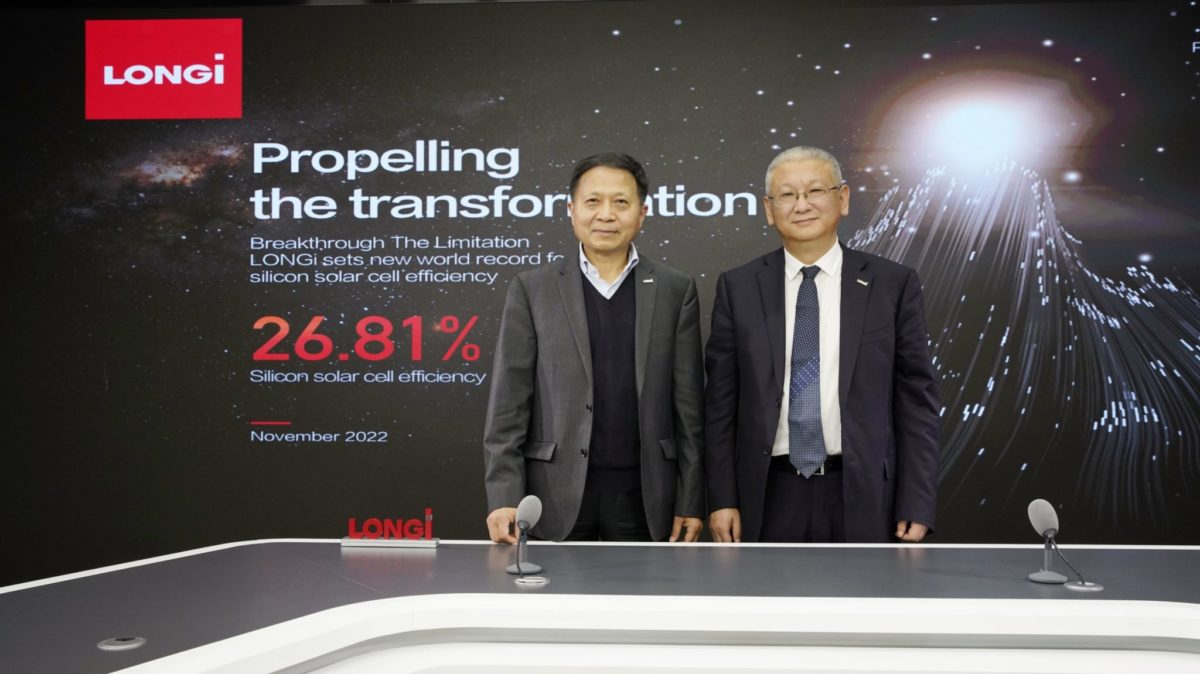From pv magazine Global
Chinese PV module maker Longi has revealed that it has achieved a power conversion efficiency of 26.81% for an unspecified heterojunction (HJT) solar cell, based on a full-size silicon wafer, in mass production. The result has been confirmed by Germany’s ISFH.
“We cannot disclose if the cell is n-type or p-type at this stage,” a company spokesperson told pv magazine.
Martin Green, a professor at the University of New South Wales in Australia and the creator of the “solar cell efficiency tables,” said the result is the highest efficiency record for silicon solar cells to date.
“This outstanding achievement will be included in the next version of efficiency tables published in the progress in photovoltaics,” he said, noting that the previous record of 26.7% was achieved by an unspecified Japanese manufacturer in 2017. Longi likely refers to the result achieved by Japanese chemical company Kaneka. Its 180cm² crystalline silicon device, which featured heterojunction and back-contact technology, achieved 26.63% efficiency.
“Longi broke a new world record for silicon solar cell conversion efficiency with 26.74%, 26.78% and 26.81% respectively, which further affirmed Longi’s determination to continuously focus on R&D investment and promote industrial progress,” said the Chinese manufacturer.
In September, the company said it had achieved an efficiency of 26.12% for a gallium-doped, p-type heterojunction (HJT) solar cell based on an M6 wafer. The company also achieved an efficiency of 25.47% for the same solar cell in March.
In addition, the Chinese manufacturer recorded an efficiency of 26.5% for a n-type heterojunction solar cell in June and a 25.19% rating for its p-type TOPCon solar cell in July 2021. In June 2021, it achieved a 25.21% efficiency rating for an n-type TOPCon PV cell.
*The article was updated on November 21 to specify that the undisclosed manufacturer cited by Longi is likely Japanese company Kaneka.
This content is protected by copyright and may not be reused. If you want to cooperate with us and would like to reuse some of our content, please contact: editors@pv-magazine.com.









By submitting this form you agree to pv magazine using your data for the purposes of publishing your comment.
Your personal data will only be disclosed or otherwise transmitted to third parties for the purposes of spam filtering or if this is necessary for technical maintenance of the website. Any other transfer to third parties will not take place unless this is justified on the basis of applicable data protection regulations or if pv magazine is legally obliged to do so.
You may revoke this consent at any time with effect for the future, in which case your personal data will be deleted immediately. Otherwise, your data will be deleted if pv magazine has processed your request or the purpose of data storage is fulfilled.
Further information on data privacy can be found in our Data Protection Policy.